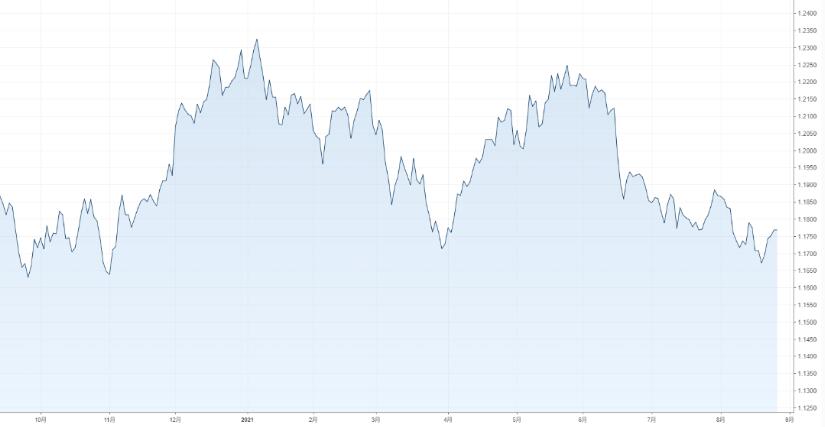Hedge funds bet heavily, the euro still falls against the dollar

This week, market risk appetite picked up, the dollar index futures trended weak, and the euro rebounded against the dollar. However, the euro has fallen by nearly 4% against the dollar this year. The euro as a whole is still relatively weak. The euro fell to the dollar for nearly 9 months. Low point. Due to the divergence of European and American monetary policies and the different speeds of economic recovery, investors are not optimistic about the future prospects of the euro.
Monetary policy differentiation
Earlier, the European Central Bank stated in a statement that the bank will not raise the key interest rate until the inflation rate is closer to the 2% target; the current key interest rate is -0.5%. The European Central Bank also expressed its willingness to increase inflation to ensure that its targets are met.
In fact, the euro area has been having difficulty pushing up inflation, and compared with the United States, the possibility of inflation in the euro area rising for a long time is also lower. The U.S. labor market is more flexible, making recruitment competition more intense, and workers can demand higher wages. Continued inflation may give the Fed a reason to raise interest rates earlier.
The European Central Bank also reiterated its commitment to purchase euro zone debt in accordance with the emergency bond purchase plan, which will last until March 2022. The market expects that the bond purchase plan will continue if inflation does not meet the target by then. The European Central Bank may not start raising interest rates until 2024 or 2025; by then, it will be ten years since the European Central Bank lowered its key interest rate to below zero for the first time. The European Central Bank had previously promised to keep interest rates low, but it was not as firm as this time.
Compared with the European Central Bank, the Fed's monetary policy is moving towards normalization.
The Federal Reserve clearly discussed reducing the size of debt purchases for the first time at the July Monetary Policy Meeting. At the same time, the minutes show that most Fed policymakers believe that if the economic recovery is in line with expectations, they will slow down their monthly purchases of US$120 billion in government bonds and mortgage-backed securities later this year. (MBS) pace.
Although Fed policymakers still have differences on when to start reducing debt purchases, some officials believe that debt purchases should be reduced and ended soon, and some believe that the Fed should patiently wait for the job market to recover more fully. Goldman Sachs also substantially raised the Fed’s November announcement of a reduction in asset purchase expectations to 45%, which is much higher than the previous estimate of 25%.
In addition, the Fed’s dot plot also implies that the Fed will raise interest rates twice before the end of 2023, and seven Fed officials predict that they will raise interest rates for the first time in 2022.
Different monetary policies in Europe and America may lead to a decline in the attractiveness of the euro. At present, the market is focusing on the upcoming Jackson Hole Central Bank Annual Meeting, expecting the Fed to give further clues to reduce the scale of bond purchases.
The degree of economic recovery varies
At present, the main factor affecting economic recovery is the impact of the epidemic. We are not medical experts, but from the perspective of the foreign exchange market, this is a simple question of who is worse than whom. Obviously, the epidemic control in the United States is not as good as that in Europe. Europe has a higher vaccination rate, and there are not as many new cases every day as the United States.
According to European Central Bank chief economist Lien, the rapidly spreading Delta variant virus may only have a limited impact on the euro zone economy, which will continue to grow strongly this year and next. Lien said that the stimulus plan will last at least until the end of March next year, and it is too early to start discussing the reduction of the stimulus plan.
If it is true that Lien said that the epidemic has little impact on Europe, why does the European Central Bank continue to maintain an extremely loose stimulus policy, while the Fed has decided to reduce asset purchases in the near future?
The severity of the epidemic in the United States may be higher than that in Europe, but in terms of economic recovery, the United States may be better than Europe. This can also be proved from economic data. The US GDP in the second quarter was 6.5%, while the euro zone's GDP growth rate was only 2%, which is far behind the United States. The market predicts that the euro zone economy will grow by about 4.5% this year, while the US's growth rate is about 7%.
Summarize
Hedge funds have begun to bet heavily that the euro against the dollar will fall, and the size of the euro against the dollar short position is close to the highest level since March 2020, and last March was the most severe period of the dollar's surge and the market collapse.
Although the rise in risk appetite in the short term will support the euro, in the medium and long term, monetary policies in Europe and the United States are gradually diverging, and the degree of economic recovery in Europe is far behind that of the United States. The euro may be under pressure against the US dollar.



